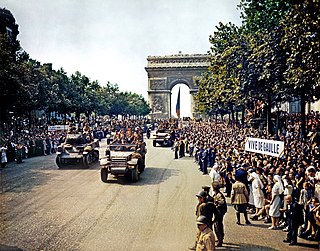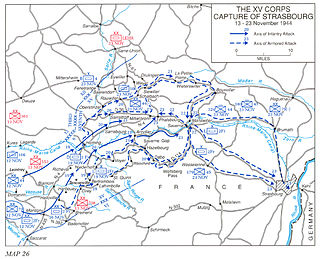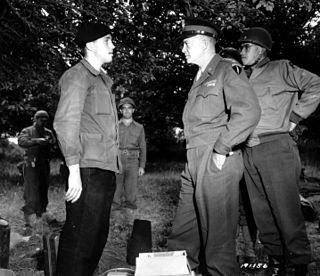
Charles André Joseph Marie de Gaulle was a French army officer and statesman who led the Free French Forces against Nazi Germany in World War II and chaired the Provisional Government of the French Republic from 1944 to 1946 in order to restore democracy in France. In 1958 amid the Algerian War he came out of retirement when appointed Prime Minister by President René Coty. He rewrote the Constitution of France and founded the Fifth Republic after approval by referendum. He was elected President of France later that year, a position which he held until his resignation in 1969.

Free France was a political entity that claimed to be the legitimate government of France following the dissolution of the Third Republic. Led by General Charles de Gaulle, Free France was established as a government-in-exile in London in June 1940 after the Fall of France during World War II and fought the Axis as an Allied nation with its Free French Forces. Free France also supported the resistance in Nazi-occupied France, known as the French Forces of the Interior, as well as gained strategic footholds in several French colonies in Africa.

The French Fourth Republic was the republican government of France from 27 October 1946 to 4 October 1958, governed by the fourth republican constitution of 13 October 1946. It was in many ways a revival of the Third Republic, which governed from 1870 during the Franco-Prussian War to 1940 during World War II, and it suffered many of the same problems.

Bayeux is a commune in the Calvados department in Normandy in northwestern France.

Asnelles is a commune in the Calvados department in the Normandy region of north-western France.

The liberation of Paris was a military battle that took place during World War II from 19 August 1944 until the German garrison surrendered the French capital on 25 August 1944. Paris had been occupied by Nazi Germany since the signing of the Armistice of 22 June 1940, after which the Luftwaffe occupied northern and western France.

The French Forces of the Interior were French resistance fighters in the later stages of World War II. Charles de Gaulle used it as a formal name for the resistance fighters. The change in designation of these groups to FFI occurred as France's status changed from that of an occupied nation to one of a nation being liberated by the Allied armies. As regions of France were liberated, the FFI were more formally organized into light infantry units and served as a valuable manpower addition to regular Free French forces. In this role, the FFI units manned less active areas of the front lines, allowing regular French army units to practice economy of force measures and mass their troops in decisive areas of the front. Finally, from October 1944 and with the greater part of France liberated, the FFI units were amalgamated into the French regular forces continuing the fight on the Western Front, thus ending the era of the French irregulars in World War II.

The Provisional Government of the French Republic was the provisional government of Free France between 3 June 1944 and 27 October 1946, following the liberation of continental France after Operations Overlord and Dragoon, and lasting until the establishment of the French Fourth Republic. Its establishment marked the official restoration and re-establishment of a provisional French Republic, assuring continuity with the defunct French Third Republic.

Raymond Triboulet was a French politician. He was a leading World War II resistance fighter who helped U.S., Canadian, and British troops invade France, which was then occupied by Nazi Germany.
Tripartisme was the mode of government in France from 1944 to 1947, when the country was ruled by a three-party alliance of communists, socialists and Christian democrats, represented by the French Communist Party (PCF), the French Section of the Workers' International (SFIO) and the Popular Republican Movement (MRP), respectively. The official charter of tripartisme was signed on 23 January 1946, following the resignation of Charles de Gaulle, who opposed the draft of the constitution. The draft envisioned a parliamentary system, whereas de Gaulle favored a presidential system.
Events from the year 1944 in France.
The May 1958 crisis, also known as the Algiers putsch or the coup of 13 May, was a political crisis in France during the turmoil of the Algerian War of Independence (1954–1962) which led to the collapse of the Fourth Republic and its replacement by the Fifth Republic led by Charles de Gaulle who returned to power after a twelve-year absence. It started as a political uprising in Algiers on 13 May 1958 and then became a military coup d'état led by a coalition headed by Algiers deputy and reserve airborne officer Pierre Lagaillarde, French Generals Raoul Salan, Edmond Jouhaud, Jean Gracieux, and Jacques Massu, and by Admiral Philippe Auboyneau, commander of the Mediterranean fleet. The coup was supported by former Algerian Governor General Jacques Soustelle and his activist allies.

The French Committee of National Liberation was a provisional government of Free France formed by the French generals Henri Giraud and Charles de Gaulle to provide united leadership, organize and coordinate the campaign to liberate France from Nazi Germany during World War II. The committee was formed on 3 June 1943 and after a period of joint leadership, on 9 November it came under the chairmanship of de Gaulle. The committee directly challenged the legitimacy of the Vichy regime and unified all the French forces that fought against the Nazis and collaborators. The committee functioned as a provisional government for Algeria and the liberated parts of the colonial empire. Later it evolved into the Provisional Government of the French Republic, under the premiership of Charles de Gaulle.

The liberation of Strasbourg took place on 23 November 1944 during the Alsace campaign in the last months of World War II. After the liberation of Mulhouse on 21 November 1944 by the 1st Armored Division, General Philippe Leclerc de Hauteclocque, and the 2nd Armored Division entered the city of Strasbourg in France after having liberated Sarrebourg and La Petite-Pierre from Nazi Germany, which cleared the way to Strasbourg.

In France there are two types of referendum:
Claude Hettier de Boislambert came to prominence during the German occupation of France in the 1940s as a Resistance leader, appointed by the Général a Companion of the Liberation in 1943. After the war, with Germany under military occupation, he served between 1946 and 1951 as governor of the region that during his period in office was reconfigured as Rheinland-Pfalz. Subsequently, he became a Gaullist member of parliament . From 1960 his contribution to public life was made, principally, as a member of the diplomatic service, notably in Africa.

The "People of Western Europe" speech was made by Supreme Commander of the Allied Expeditionary Force General Dwight D. Eisenhower in the run-up to the invasion of Normandy in 1944. Addressed to the people of occupied Europe it informed them of the start of the invasion and advised them on the actions Eisenhower wanted them to take. It also addressed the Allies' plans for post-liberation government.

The liberation of France in the Second World War was accomplished through diplomacy, politics and the combined military efforts of the Allied Powers, Free French forces in London and Africa, as well as the French Resistance.

The French constitutional Law of 2 November 1945 was an interim, transitional constitutional law that set a legal basis for government in France under the Provisional Government of the French Republic (GPRF) for one year until a new constitution was approved.














